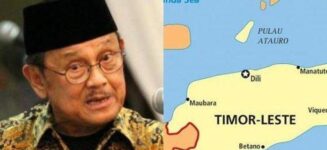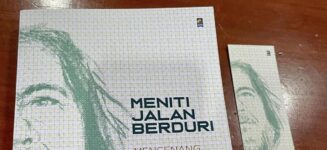https://groups.yahoo.com/neo/groups/nasional-list/conversations/messages/40861
The article (‘ Recognizing and rectifying the errors of the past’) was published in The Jakarta Post September 30, 2006
Aboeprijadi Santoso, Amsterdam
As Justice and Human Rights Minister Hamid Awaluddin is about to
embark on a new mission to offer citizenship to former students of
the sixties abroad — the so called ex-mahids (students who studied
abroad on government sponsorship) — it’s important to notice that
the issue is not simply about offering Indonesian citizenship.
It’s about the need to recognize and rectify the state’s past
wrongdoings. Moreover, it should be part of a bigger framework
within the truth and reconciliation process. Ultimately it’s a test
of the government’s political will to build a truly new Indonesia.
When the news spread last August that President Susilo Bambang
Yudhoyono had instructed Minister Hamid Awaluddin to offer former
students of the sixties, who have been living as exiles abroad,
Indonesian citizenship, the issue led to a heated debate among the
exiles in Europe.
Basically, there is nothing new about the offer. Many highly placed
officials, including former President Soeharto, have asked them to
return home, but hardly got a serious response. One important
exception was when President Abdurrachman ‘Gus Dur’ Wahid sent then
Justice and Human Rights Minister, Yusril Ihza Mahendra, to meet
them in The Hague, in January 2000.
In the 1960s President Sukarno sent thousands of students to the
Soviet Union, China and Eastern Europe to study on state-
fellowships. Most have returned home, but a few hundred, mostly of
the political left, remained abroad for fear of reprisals at home.
Whether they were students or not, the distinction became irrelevant
as they all — former ambassadors, officials and cadres of the
former communist party PKI and the Partindo — suffered a common
fate. The specter of 1965 persecutions at home and the intimidating
Cold War climate abroad finally brought them from China and the
Soviet Union to West Europe, where most now reside in the
Netherlands, Germany and France. They became exiles, work and die
here — it’s a life “born out of blood, pain, sadness, anger and
spirit”, the exiled poet Sobron Aidit once put it.
Gus Dur called them “the wandering freedom fighters” since many of
them had taken part in Indonesia’s independence struggle. On the
other hand the fact that they lost their citizenship and civil
rights abruptly in the mid-1960s, with its far reaching
consequences, is still a painful memory. This predictably will be a
crucial issue when Hamid meets them next week in The Hague and
Paris.
For, what happened in many embassies as Gen. Soeharto took power in
1966 was in fact a coup d’etat. Ambassadors loyal to Sukarno
resigned and instead of the charge d’affaires, the military attaches
took over and issued a statement demanding political loyalty to the
new government of Soeharto. Those who refused to sign were at one
stroke condemned to exile.
That’s a human rights violation, they now claim. Hence, they demand
rehabilitation with an admission of wrongdoing on the part of the
government. “It’s a matter of honor,” Ibrahim Isa, an exiled
journalist says, summing up the argument. “It’s illegal,” exiled
lawyer Wijanto pointed out. According to Indonesian law, only the
Justice Ministry is entitled to decide on citizenship.
However, it would appear, Minister Hamid doesn’t intend to do
anything more than offer them the opportunity to regain an
Indonesian passport in connection with the new Citizenship Law.
Indeed, he categorically rejected the idea of discussing the human
rights issues involved when he met one ex-mahid, Tom Iljas, in
Helsinki on Sept. 11. “Do you want a passport, or not!” Hamid was
quoted as saying angrily as he read Iljas’s open letter to President
Susilo.
The truth is regaining citizenship may not even be the issue.
Hamid’s plan is a case of too little, too late. Most exiles are now
too old to pursue a career at home and have given up hope of
returning home. “Moreover, since 1998, we could go home freely, some
have even died there, so the problem is not about passports,”
Ibrahim Isa insisted.
Many exiles, therefore, hope Minister Hamid will be open and ready
to engage in a dialog and discuss the human rights and political
issues involved. The minister should understand that despite their
foreign passports, “these exiles truly love Indonesia and feel
Indonesian,” said Ibrahim.
Few, perhaps, are ready to welcome Hamid’s offer just as several
would like to see the decree on banning Marxism and communism
removed before accepting the offer, but most exiles want at least a
dialog on their civil and human rights.
The humiliation, in any case, of having to live abroad and being
denied citizenship for decades by an illegitimate act of the state
they had helped found, is intensely felt. “I do not demand anything
(even if I were entitled to). The government has to understand us
and offer an apology,” said Francisca Fangidey, a former legislator
and freedom fighter who lost her husband during the independence
struggle.
The pain is even greater as Jakarta has offered amnesty and
considerable compensation to former Free Aceh Movement (GAM)
separatists, but not to the left-wing exiles. “We never rebelled
against the unitary state. So, I feel that President Yudhoyono will
have some sensitivity toward us,” said Ibrahim.
In a reconciliatory spirit similar to Gus Dur’s in 2000, Information
and Communications Minister Sofyan Djalil had publicly offered an
apology to the exiles at a meeting with the Indonesian community in
Stockholm recently. Like Sofyan, Hamid was part of Jusuf Kalla’s
team, who pursued a dialog with GAM, and led the Indonesian
delegation to a successful peace deal in Helsinki.
Hamid’s predecessor, Yusril Ihza Mahendra, has been criticized for
allegedly lacking the will to implement Gus Dur’s instruction. But,
in a way that Hamid never did, Yusril had publicly admitted that the
exiles had actually lost their citizenship illegally, thus
recognizing the political and human rights issues involved.
It would be deeply ironic, not to mention dishonest, for a human
rights minister if Hamid Awaluddin, in the tradition of New Order
bureaucrats, denies the issue and resolves the problem of the exiles
as if it were a mere technical-administrative issue, rather than a
political one.
The writer is a journalist with Radio Netherlands.



